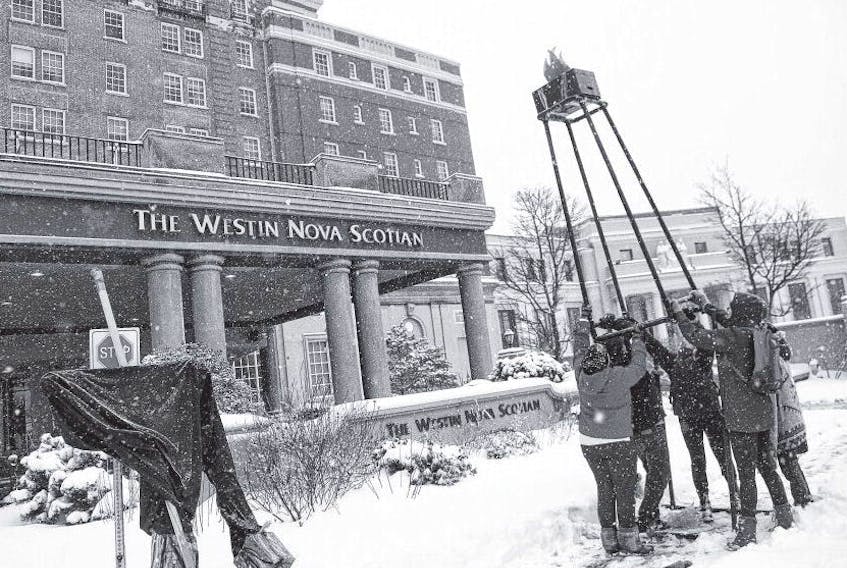The fracking monster reared its head on a snow-covered Halifax sidewalk Wednesday afternoon.
Outside the Westin Nova Scotian, nine game protesters bearing No Fracking signs hoisted a large and unsightly Frackenstein monster to demonstrate against what they believed would be the tone of conversation at the Maritimes Energy Association’s annual general meeting inside.
“Fracking causes terrible risks to groundwater, the water we drink, farmland, which is where the food we eat comes from, human health and wildlife health, air quality and it contributesenormously to climate change,” said Robin Tress of the Council of Canadians, who spearheaded the sidewalk assembly.
“The risks of fracking are enormous, the impacts of fracking are well documented and we said no to it already.”
Geoff MacLellan, the province’s energy minister, was to deliver the keynote address to the MEA shortly after the no-fracking demonstrators gathered and hastily erected a shaky plastic fracking rig. In light of the recently released onshore petroleum atlas that pegged natural shale gas resources in the province at a value of between $20 billion and $60 billion, MacLellan has waffled slightly about the fracking moratorium legislated in 2014.
The fracking ban is still in effect,” he said, adding that “if we begin to hear from stakeholders and feedback from the province as a whole that we are looking to revisit this conversation, we’ll certainly do so.
“This (atlas) information is vital to stimulate that discussion.”
Hydraulic fracturing is the process of pumping a large volume of a high-pressured waterand- chemical mixture into underground rock, fracturing the rock formation and stimulating the flow of natural gas or oil. A 347-page report from a panel led by David Wheeler recommended in 2014 that much more study was needed to determine the health, environmental, economic and community impacts of fracking before endorsing the practice in the province.
“When the minister says he’s looking forward to the discussion, we’re not,” Tress said. “We already had the discussion.
“Natural gas has a higher carbon footprint than coal.”
Most of the footprints in the wet snow Wednesday were from the protesters. Passersby, few and far between, shuffled along quickly, some stopping briefly to accept a handout from a demonstrator.
“I agree with it (protest) but I have to go to class,” said Felicity MacIsaac, an 18-year-old NSCAD University student. “I definitely don’t want it to happen.”
Much of the shale gas identified in the atlas created for the energy department is located in the Windsor-Kennetcook and Cumberland sub-basins.
“If you look at where there are shale gas deposits in Nova Scotia, all of them are places where we are already using the land for productive uses like farming,” Tress said.
Tress said fracking and natural gas would make the province more dependent on an outdated energy.
“An overarching reason that the Council of Canadians is very opposed to natural gas extraction, including fracking of natural gas, is that it locks us into climate change. Most of the natural gas that Nova Scotia uses is fracked,and every piece of infrastructure that we build that grows the natural gas industry takes us one step further away from the renewable energy future that we need and keeps us in a fossil fuel past.”
Wheeler said last week that his report recommended that the province not revisit the fracking issue without independently conducted scientific research that would include public participation.
“I would not classify this atlas as inclusive and participatory research, because it didn’t include Indigenous peoples and Indigenousperspectives and it didn’t have climate or groundwater scientists,” Tress said.
Ray Ritcey, chief executive of the MEA, has said that he hopes the Nova Scotia government would revisit the moratorium on fracking following the release of the gas atlas.
The MEA evolved from the Offshore-Onshore Technology Association of Nova Scotia. The not-for-profit association represents more than 300 businesses that provide goods and services to the energy industry in Eastern Canada.









